
Any type of bleeding that originates in the gastrointestinal tract—which includes the esophagus, stomach, small intestine, large intestine (colon), rectum, and anus—is referred to as gastrointestinal bleeding (GI bleeding), a dangerous medical condition. Mild to severe gastrointestinal bleeding may be a sign of an underlying illness that requires emergency care. The primary causes, typical symptoms, and indicators that it’s time to consult a gastroenterologist will all be covered in this blog.
What Is Gastrointestinal Bleeding?
Gastrointestinal (GI) bleeding is a serious condition that affects the digestive tract, from the esophagus to the rectum. It can range from mild to life-threatening and often serves as a symptom of an underlying health problem. Bleeding can occur in the upper or lower GI tract and may be caused by a variety of conditions, including ulcers, hemorrhoids, and inflammatory bowel diseases.
Common Causes of GI Bleeding (Ulcers, Polyps, IBD)
Understanding what triggers GI bleeding can help in timely diagnosis and treatment. Some of the most common causes include:
- Peptic ulcers: Sores in the stomach lining due to H. pylori or NSAIDs.
- Hemorrhoids: Swollen veins in the rectum or anus that bleed.
- Diverticulosis: Small pouches in the colon that can bleed.
- Colon polyps or colorectal cancer: May bleed intermittently.
- Inflammatory bowel diseases like Crohn’s disease or ulcerative colitis.
Symptoms You Shouldn’t Ignore (Rectal Bleeding, Anemia)
GI bleeding often shows up in a few common ways:
- Bright red blood in the stool or on toilet paper
- Black, tarry stools (melena)
- Vomiting blood (hematemesis)
- Unexplained fatigue or dizziness
- Iron-deficiency anemia If you notice any of these symptoms, it’s crucial to speak with a gastroenterologist promptly.
When to See a Gastroenterologist for GI Bleeding
You should consult a specialist if you experience persistent GI symptoms, including ongoing abdominal pain, rectal bleeding, or unexplained weight loss. Dr. Karim Shakoor, an experienced gastroenterologist at Colon & Digestive Health Specialists LLC in Conyers, GA, offers advanced diagnostics and personalized care plan
Diagnostic Tests for GI Bleeding (Colonoscopy, Endoscopy)
To determine the source of bleeding, your doctor may recommend:
- Colonoscopy: A thin, flexible tube to inspect the colon and rectum
- Upper endoscopy: Examines the esophagus, stomach, and upper intestine
- Capsule endoscopy: A swallowable camera capsule
- CT angiography or tagged red blood cell scan for internal bleeding
Treatment Options from Colon & Digestive Health Specialists
Depending on the cause and severity, treatment may include:
- Medication to heal ulcers or control IBD
- Minimally invasive procedures to remove polyps or stop active bleeding
- Blood transfusions in cases of significant blood loss
- Lifestyle and dietary changes to improve gut health
Managing Chronic GI Conditions Like Ulcerative Colitis
If your GI bleeding stems from chronic inflammation, Dr. Shakoor offers:
- Ulcerative colitis treatment
- Diverticulitis management
- Colon health assessments
- Gastrointestinal bleeding evaluation
Book a Consultation with Dr. Karim Shakoor
Take Control of Your Digestive Health Today If you’re experiencing signs of gastrointestinal bleeding, don’t wait. Book an appointment with Dr. Karim Shakoor, a board-certified gastroenterologist at Colon & Digestive Health Specialists LLC in Conyers, GA. We offer comprehensive diagnostics, treatment for GI conditions, and personalized digestive health plans.
A: Gastrointestinal bleeding refers to bleeding that starts in the digestive tract. It may appear in vomit or stool and should always be evaluated by a gastroenterologist like Dr. Karim Shakoor.
Common causes include ulcers, diverticulitis, hemorrhoids, colon polyps, inflammatory bowel disease (IBD), and colon cancer. A proper diagnosis by a specialist is key.
if you notice black or bloody stool, vomiting blood, or unexplained weakness, consult the Dr. immediately for a thorough evaluation.
Yes. Colon cancer is a leading cause of lower GI bleeding. Early detection through colonoscopy can be life-saving.
A: Diagnosis may involve colonoscopy, endoscopy, imaging, or lab tests. Our clinic uses advanced diagnostic tools to pinpoint the source accurately.
A: Treatment may include medication, endoscopic procedures, or surgery. Dr. Karim Shakoor provides personalized care based on the source and severity.
A: Colonoscopy helps detect polyps or cancer early, preventing serious complications. Schedule your colon health check with our team today.
A: Our clinic, led by experienced gastroenterologist Dr. Karim Shakoor, offers expert care in GI bleeding, colon health, liver disease, and more.
